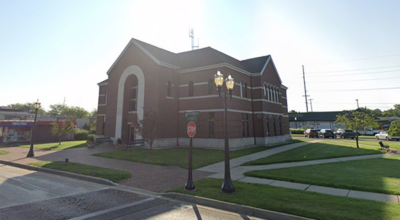City raises pay scale 1.75 percent
Published 2:06 am Tuesday, October 26, 2010

Dowagiac's new one-person leaf vacuum truck is expected to save $16,000 to $20,000 in labor and fuel costs during fall collection.
Dowagiac City Council Monday night approved a 1.75-percent annual adjustment to the non-union classification and compensation system effective Oct. 1.
There are 11 pay grades at City Hall with salaries ranging from $19,459 to $25,299 for a Dial-a-Ride driver to $62,271 to $80,952 for public safety and public services directors.
“We’re moving the class and comp system in the same amount we have done with union employees — IBEW two weeks ago, plus the ones before you tonight” for police patrol officers and sergeants. “Employees are taking on much greater shares of deductibles and co-insurance costs. As such, we’ve been able to hold the line on what would have been a horrific increase.”
“It is important to note there are a couple of jobs changing some grades based on the necessary skill levels,” Anderson added.
“One reflects restructuring that took place in the Fire Department. The other, utilities specialist, for the computer skills needed to run that system. It’s also important to note that within the class and comp system, although we’re moving the scale 1.75 percent, that doesn’t mean that everyone is automatically entitled to it. They’ve got to meet performance standards.”
The city established a fire captain position at grade 8 ($41,757 to $54,284) and the utility specialist position was reclassified from grade 3 ($27,779 to $36,112) to grade 5 ($32,848 to $42,703) to reflect technical knowledge required.
Anderson said only two employees are “bumping” the maximum end of the pay scale. “Otherwise,” he said, “most are in the middle to two thirds.”
Council approved one-year collective bargaining agreements between the City of Dowagiac and the Police Officers Labor Council (POLC) patrol officers unit for Oct. 1, 2010-Sept. 30, 2011.
Police ratified terms on Oct. 18.
Health insurance plans were “completely revamped” under the new contract in response to the almost 39-percent increase from Blue Cross Blue Shield of Michigan.
Under the new 48-page agreement, the city continues to offer two levels of PPO plans: a base PPO plan with a $1,000/$2,000 deductible, prescription co-pay of $10 for generic and $40 for brand name and an office visit co-pay of $40.
Under the base plan, a $500 reimbursement incentive applies to cover the first portion of the deductible or other out-of-pocket medical expenses as appropriate.
The second plan offers a $500/$1,000 deductible and a prescription co-pay of $10 for generic and $20 for brand name.
Both plans provide 100-percent coverage for prevention services up to an annual maximum of $1,000.
“On balance,” Anderson advised the council, “I believe the proposed contract is fair and equitable for both the city and union. It accomplishes most of the objectives identified at the beginning of negotiations while also addressing several issues that were important to the union membership. Employees were extremely cooperative in trying to deal with a real difficult health renewal this year, and I think the contracts reflect that.”
Patrol officers’ salary range starts at $35,682.33 and $17.15 an hour and increases in four years to $45,903.98 and $22.07.
Council accepted the quarterly investment report showing $7,034,751 total market value of cash and investments.
Citizen Bill Lorenz questioned why $4,833,308 sat in non-interest bearing checking accounts at Huntington Bank.
“On the surface, that looks wrong.”
Mayor Don Lyons and Third Ward Councilman Dr. Charles Burling indicated they shared the same concern.
Anderson responded, “We’re certainly going to look at interest-bearing accounts and the portfolio of investments. I expect you’ll see a different picture with your next quarterly investment report.”
“We just went through that exercise not too long ago with the Cass County Transportation Authority, which I chair,” Lyons said. “If you’re willing to go out a couple three years, you can get over 2 percent.”
Eunice Murray addressed the council and urged it to consider: when utility service is applied for on property, require documentation that applicants have a legal right to have utilities in his or her name; and the person who has the utilities in his or her name be responsible for payment of utility charges; and he or she signs a form “Affidavit of Responsibility for City of Dowagiac Utility Charges.”
In a section of the form the City of Dowagiac may request any necessary action to collect outstanding utility charges.
Actions may include, but are not limited to: submitting a delinquent account to an attorney; engaging a collection agency; and instituting a small claims suit or legal action.
All costs related to the above would be added to his or her account.
When the property is a rental, Murray suggested the responsibilities would be as follows: informing the City of Dowagiac utilities department to put the utilities in the manager’s, landlord’s or property owner’s name when the tenant moves out.
If available, provide the city with the tenant’s forwarding address.
Tenants Murray would make responsible for providing a copy of the lease agreements; paying the required deposit; paying utility charges; and providing a correct forwarding address.
“We at the rental association feel it’s fair because when you make the debt, you pay the debt,” Murray said. “Nobody else pays your debts for you. Please consider this.”
Council also heard from apartment manager Vicky James. She inquired as to whether tenants’ past-due utility bills she paid had been reported to a credit bureau or whether they had been “red-flagged” before they open new utility accounts.
“We recognize it’s an issue and we’re kicking around what to do about it,” the city manager said.
James also wanted to know why if the city ordinance was in effect in 2005, it waited so many years to bill “out of the blue. We’re willing to work with the council to amend the ordinance because we think it’s unfair to go back this far.”
Anderson acknowledged that the Road Commission paved Jones Street.
“In total,” he said, “a couple hundred thousand dollars of paving will be done. It’s all weather-dependent. We’ve gotten a couple of good reports back on leaf collection, which seems to be moving along. Probably during the last week, we’ll have the other truck out as well for a period because of the heavy volume. In eight hours Saturday, they dumped twice. You can get almost twice as much in this vehicle. Not quite, but almost.
“If weather permits, I’d like to get every single leaf before the snow flies because it’s just that much easier to do it now than in the spring.”
Council adopted 11 pages of budget revisions to close out the 2009-2010 fiscal year which expired Sept. 30.
Council canceled its Dec. 27 meeting because it falls between Christmas and New Year’s holidays.
Council authorized Finance Director David Pilot to pay out $394,358.05, including $205,220.30 for bills and payroll of $189,137.75.
Second Ward Councilman Jim Dodd saw the city’s new firetruck taking shape in South Haven and “it took my breath away.”
Council members Bob Schuur and Lori Hunt and City Attorney Mark Westrate were absent.






